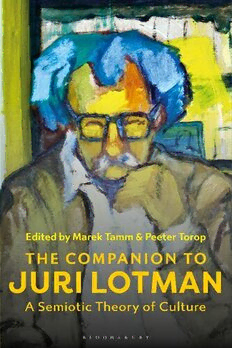Download The Companion to Juri Lotman: A Semiotic Theory of Culture PDF Free - Full Version
Download The Companion to Juri Lotman: A Semiotic Theory of Culture by Marek Tamm; Peeter Torop (editors) in PDF format completely FREE. No registration required, no payment needed. Get instant access to this valuable resource on PDFdrive.to!
About The Companion to Juri Lotman: A Semiotic Theory of Culture
Juri Lotman (1922–1993), the Jewish-Russian-Estonian historian, literary scholar and semiotician, was one of the most original and important cultural theorists of the 20th century, as well as a co-founder of the well-known Tartu-Moscow School of Semiotics. This is the first authoritative volume in any language to explore the main facets of Lotman’s work and discuss his main ideas in the context of contemporary scholarship.Boasting an interdisciplinary cast of contributing academics from across mainland Europe, as well as the USA, the UK, Australia, Argentina and Brazil, The Companion to Juri Lotman is the definitive text about Lotman’s intellectual legacy. The book is structured into three main sections – Context, Concepts and Dialogue – which simultaneously provide ease of navigation and intriguing prisms through which to view his various scholarly contributions. Saussure, Bakhtin, Language, Memory, Space, Cultural History, New Historicism, Literary Studies and Political Theory are just some of the thinkers, themes and approaches examined in relation to Lotman, while the introduction and thematic Lotman bibliography that frame the main essays provide valuable background knowledge and useful information for further research.The book foregrounds how Lotman’s insights have been especially influential in conceptualizing meaning making practices in culture and society, and how they, in turn, have inspired the work of a diverse group of scholars. The Companion to Juri Lotman shines a light on a hugely significant and all-too often neglected figure in 20th-century intellectual history.
Detailed Information
| Author: | Marek Tamm; Peeter Torop (editors) |
|---|---|
| Publication Year: | 2021 |
| ISBN: | 9781350181625 |
| Pages: | 553 |
| Language: | English |
| File Size: | 15.758 |
| Format: | |
| Price: | FREE |
Safe & Secure Download - No registration required
Why Choose PDFdrive for Your Free The Companion to Juri Lotman: A Semiotic Theory of Culture Download?
- 100% Free: No hidden fees or subscriptions required for one book every day.
- No Registration: Immediate access is available without creating accounts for one book every day.
- Safe and Secure: Clean downloads without malware or viruses
- Multiple Formats: PDF, MOBI, Mpub,... optimized for all devices
- Educational Resource: Supporting knowledge sharing and learning
Frequently Asked Questions
Is it really free to download The Companion to Juri Lotman: A Semiotic Theory of Culture PDF?
Yes, on https://PDFdrive.to you can download The Companion to Juri Lotman: A Semiotic Theory of Culture by Marek Tamm; Peeter Torop (editors) completely free. We don't require any payment, subscription, or registration to access this PDF file. For 3 books every day.
How can I read The Companion to Juri Lotman: A Semiotic Theory of Culture on my mobile device?
After downloading The Companion to Juri Lotman: A Semiotic Theory of Culture PDF, you can open it with any PDF reader app on your phone or tablet. We recommend using Adobe Acrobat Reader, Apple Books, or Google Play Books for the best reading experience.
Is this the full version of The Companion to Juri Lotman: A Semiotic Theory of Culture?
Yes, this is the complete PDF version of The Companion to Juri Lotman: A Semiotic Theory of Culture by Marek Tamm; Peeter Torop (editors). You will be able to read the entire content as in the printed version without missing any pages.
Is it legal to download The Companion to Juri Lotman: A Semiotic Theory of Culture PDF for free?
https://PDFdrive.to provides links to free educational resources available online. We do not store any files on our servers. Please be aware of copyright laws in your country before downloading.
The materials shared are intended for research, educational, and personal use in accordance with fair use principles.

